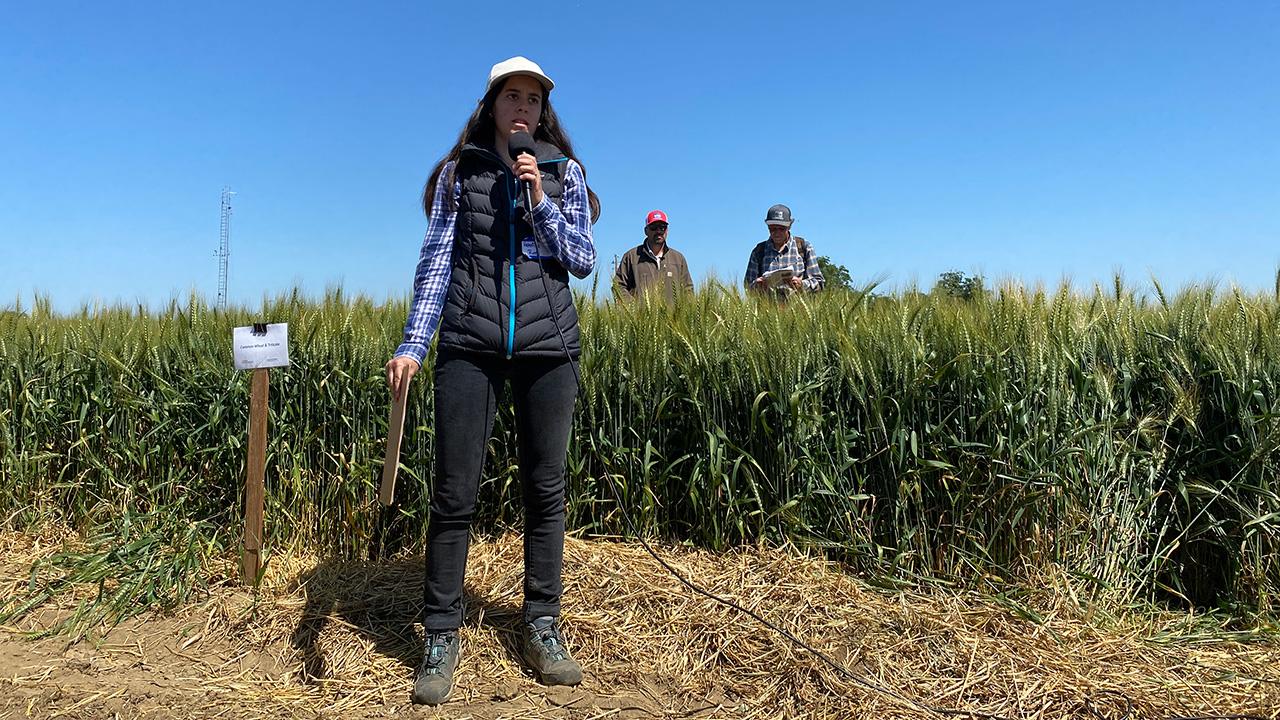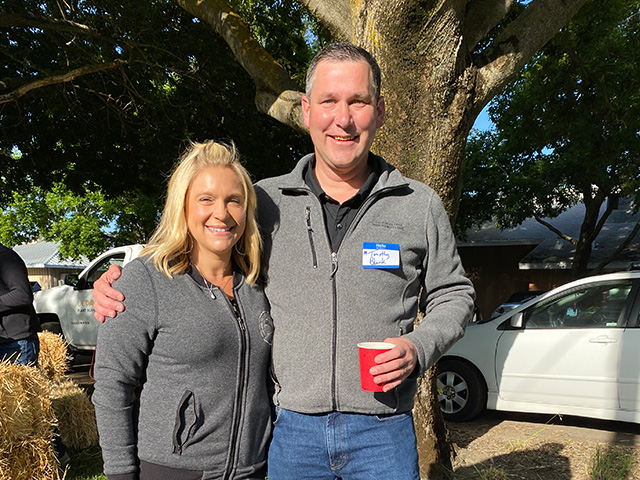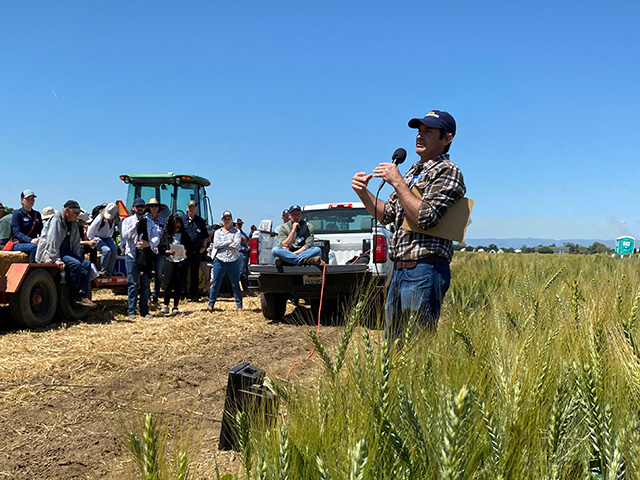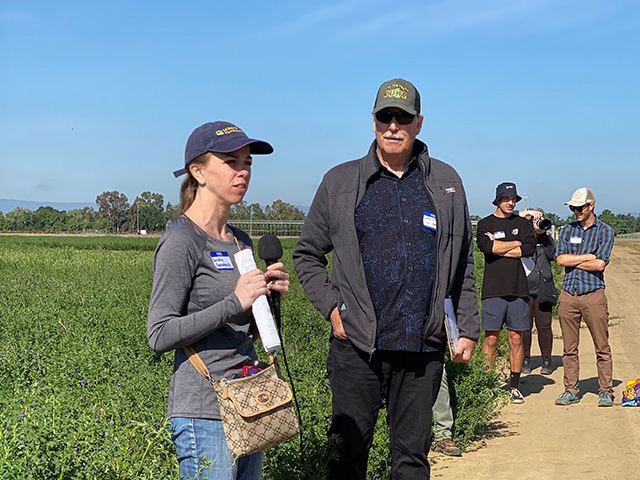
Recycled green waste offers alternative to fertilizer
Roel gives early results during Small Grains Field Day
Quick Summary
- Recycled food and yard waste mixed with urea performed as well as urea only in early trials.
- Advice given for barley, irrigation, alfalfa, weeds
Doctoral student Valentina Roel is looking at ways to use food scraps and yard waste as alternatives to nitrogen fertilizer for crops. When processed, the leftovers and garden trimmings being diverted from state landfills might be effective substitutes, because they contain both nitrogen and carbon in forms that promote soil health.

They also provide a path for slowing climate change.
Roel has started on a three-year experiment to try these fertilizer alternatives on triticale, sunflowers and grass hay. A mix of food and yard waste was turned into both liquid and solid forms of biofertilizers, then put on a field planted in November 2022. During the growing season, Roel measured crop yields and organic matter in the soil. Early results show the soil amendments performed well: She measured little difference in yield between plots given a combination of the soil amendments plus urea (a commonly used, nitrogen-rich, inorganic fertilizer), and other plots treated with urea only, so long as both were applied at the same rate.
This means farmers potentially could reduce the amount of nitrogen fertilizer they put on their fields by using the plant-based amendments instead, Roel said.
“We’ve seen the potential for plants to get the nutrients they need from these soil amendments made from recycled organic waste. In our project, I’m trying to get a clear picture of the benefits and risks of this approach,” Roel explained. “This will allow us to develop strategies for farmers to make agriculture more productive, but with less damage to the environment.”
Re-using green waste adds to climate solutions

Roel expects to figure out how much of these alternatives farmers can use to reduce their use of nitrogen fertilizers, and to see whether their use can be profitable. She is working with the Yolo County landfill, the UC Davis Renewable Energy Anaerobic Digestor and California SafeSoil to test different soil amendments. She’s also working with a local farmer to measure how the alternatives impact his crop yields and soil health on his land. Cameron Pittelkow, an associate professor, and Mark Lundy, an assistant professor of UC Cooperative Extension, are overseeing the project
Their work, which is funded by the state’s Healthy Soils Program, contributes to a larger statewide effort to reduce methane produced in landfills. Earth’s air has just a tiny amount of methane gas, but methane is even more powerful than carbon dioxide for warming the atmosphere. Methane forms when plants and other organic material in garbage rot deep in a dump, where oxygen is scarce.
For that reason, California seeks to reduce organic waste going to landfills by 75 percent as one more action to slow down climate change. The state law directing this and related actions, Senate Bill 1383, went into effect in 2022.
Field Day: Advice for barley, limited water, pests and weeds
Roel presented her findings during the 2023 UC Davis Small Grains and Alfalfa/Forages Field Day, held May 11 near Davis. Other research presented includes:

Malting barley: Doctoral student Maany Ramanan discussed the how environment interacts with genes to affect the productivity and quality of malting barley in California. She has been looking particularly at the temperature at which starch converts to sugars. Ramanan works with Lundy and Christine Diepenbrock, an assistant professor in the department, to find varieties that can give brewers what they need amid the stresses of climate change.
Irrigation: Lundy summarized research on boosting production while using less water in California’s Central Valley. In the San Joaquin Valley, he recommended planting early and irrigating early in the growing season. New management approaches and crop types can help farmers get the most out of fall crops, when water is limited. Rather than letting land go fallow, Lundy suggested planting winter cereals as a relatively low-cost, flexible option.
Read more about limited-water agriculture in the San Joaquin Valley.
Alfalfa: Dan Putnam offered advice for choosing alfalfa varieties that can thrive despite pests and weeds. Farmers should research the best variety for a particular field, he said: The economic differences can amount to $2,000 per acre. Look at the seed plus the cost of technology plus the cost of pest management. Plant early in the fall, and irrigate to strengthen the young plants before weeds take hold, he advised.
Future trials will look more closely at the interaction of irrigation and drought, Putnam added.
Putnam is a professor of Cooperative Extension in the department. He was planning to retire this summer, Lundy announced.
Weeds: “Know your weed. Knowing what you’re managing is step No. 1,” advised Brad Hanson, a professor of Cooperative Extension in the department. “Look for places in the field where it’s difficult to get your crop established. That’s where weeds grow.”
Read more about weed management.
Media Resources
- Trina Kleist, UC Davis Department of Plant Sciences, tkleist@ucdavis.edu, (530) 754-6148 or (530) 601-6846
